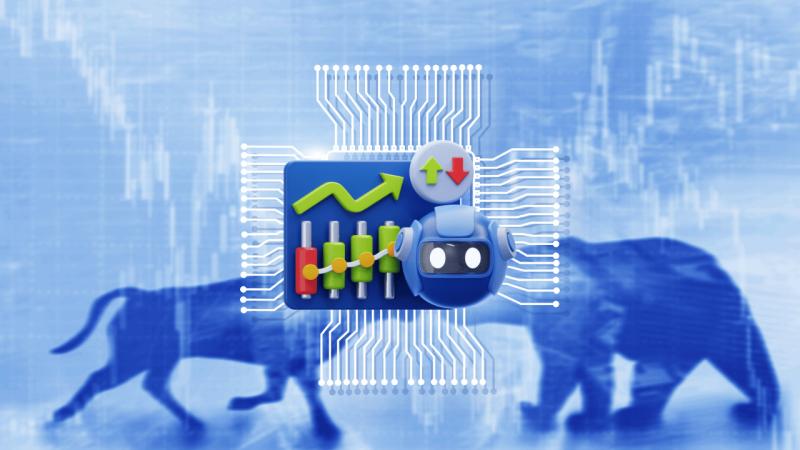How AI Is Used in Stock Trading?

Artificial Intelligence (AI) is revolutionizing the world of stock trading, offering tools and insights that were once unimaginable. While human judgment remains essential, AI is playing an increasingly pivotal role in modern financial markets. By 2023, the global AI trading market reached a valuation of $18.2 billion, with projections suggesting it could nearly triple by 2033. This explosive growth highlights the significant role AI is playing in reshaping the trading landscape.
In this article, we explore how AI is transforming stock trading, the tools driving this change, and the potential benefits and risks that come with adopting these technologies.
What Is AI Trading?
AI trading broadly refers to using artificial intelligence, predictive analytics, and machine learning to analyze market data, forecast trends, and execute trades. It encompasses a range of techniques such as quantitative analysis, algorithmic trading, and high-frequency trading.
These technologies allow investors and institutions to sift through enormous datasets, recognize patterns, and automate their trading processes, all while minimizing human error. The overarching goal of AI trading is to increase efficiency, reduce risk, and ultimately enhance returns.
How AI Stock Trading Works
AI trading systems analyze market conditions, execute trades, and manage risk by leveraging a variety of technologies, including:
- Quantitative Trading: This method uses mathematical models to analyze price and volume data, helping investors spot profitable opportunities.
- Algorithmic Trading (Algo-Trading): Algorithms are employed to make decisions based on historical market data. This approach allows traders to break large orders into smaller transactions, reducing market impact.
- High-Frequency Trading (HFT): With the use of high-powered computers, millions of trades can be executed in milliseconds, providing a competitive edge.
- Automated Trading: This is a more simplified form of algo-trading, where trades are executed based on pre-programmed strategies.
- Arbitrage Trading: AI identifies price differences across multiple markets, allowing traders to exploit those variations for profit.
These methods underscore the vast potential AI offers in enhancing the speed and accuracy of trading decisions.
Key AI Tools in Stock Trading
AI has introduced several tools that traders use to optimize their strategies:
- Portfolio Managers: These AI tools autonomously build and manage investment portfolios based on the investor's financial goals and risk tolerance.
- Trading Robots: AI-powered robots execute trades according to pre-programmed rules. Unlike human traders, these robots can operate 24/7, ensuring no opportunity is missed.
- Signals: These alert traders when certain stocks meet preset criteria, although unlike trading robots, they do not execute trades automatically.
- Strategy Builders: Traders can customize these AI tools to follow specific rules. Before committing to real trades, strategies can be backtested on historical data to gauge potential performance.
By integrating these tools, traders can automate many aspects of the decision-making process, leading to faster, more informed trades.
AI Trading Use Cases
AI is not only used to execute trades but also to enhance other aspects of investing. These include:
- Data Mining: AI processes historical data to uncover trends and patterns that may inform future trades.
- Sentiment Analysis: AI analyzes social media, news, and other online sources to gauge market sentiment and predict market moves.
- Predictive Modeling: AI algorithms use past data to predict future trends, providing traders with foresight into potential market behaviors.
- Risk Modeling: AI assesses risk by analyzing various potential scenarios, enabling traders to adjust their strategies accordingly.
- Backtesting: AI helps simulate trades based on historical data, allowing traders to refine their strategies before executing them in the real world.
The Benefits of AI in Stock Trading
AI trading offers several distinct advantages:
- Reduced Research Time: AI automates the process of data analysis, allowing traders to focus on strategy rather than research.
- Improved Accuracy: AI models reduce the risk of human error, enhancing the precision of trades.
- Predicting Patterns: With sentiment analysis and predictive models, AI systems can identify patterns and forecast market movements more accurately than human traders.
- Enhanced Risk Management: AI continuously monitors the market and adjusts strategies, helping traders avoid emotional, spur-of-the-moment decisions.
- Lower Costs: AI can reduce overhead costs by automating repetitive tasks traditionally performed by analysts and traders.
Risks and Challenges of AI Trading
While AI trading offers significant benefits, it comes with its own set of risks:
- Lack of Transparency: The complexity of AI algorithms makes it difficult for traders to fully understand how decisions are made, raising ethical concerns and regulatory challenges.
- Reliance on Historical Data: AI predictions are based on past data, which may not account for unprecedented market events or extreme volatility.
- Larger-Scale Errors: A small coding error can result in catastrophic losses, especially in high-frequency trading, where millions of trades are executed in a short time.
- Cybersecurity: AI systems are vulnerable to hacking and manipulation, posing a risk to financial stability.
The Future of AI in Stock Trading
The future of AI in stock trading is bright, with innovations such as machine learning and natural language processing becoming more advanced. As AI continues to evolve, it is expected to play an even greater role in optimizing investment strategies, managing risks, and generating profits.
AI trading is becoming increasingly accessible to retail investors, providing tools once reserved for large financial institutions. However, the need for human oversight remains critical, as AI trading tools must be monitored and updated regularly to adapt to changing market conditions.
Conclusion
AI has fundamentally changed the landscape of stock trading. From automating portfolio management to executing high-speed trades, AI has made investing more efficient, accurate, and accessible. However, traders should remain cautious of the risks and limitations that come with relying on AI technologies. By using AI as a tool rather than a replacement for human judgment, investors can leverage its full potential to achieve higher returns and better manage risk in an ever-evolving market.


Comments (2)
Enda Trading
8
Irish , Trader, Entrepreneur
You're welcome! Absolutely agree—AI's ability to analyze data in real time and adjust strategies on the fly is a game-changer. It not only improves decision-making but also helps traders stay ahead in fast-moving markets.
Anna Disuza
3
Great Thanks for your inputs AI is used in stock trading to analyze vast amounts of market data quickly identify patterns and make predictions on stock price movements. Algorithms powered by AI can execute trades at optimal times manage risk and adjust strategies based on real time market changes. This helps traders and firms make more informed decisions enhance efficiency and reduce human error in trading.